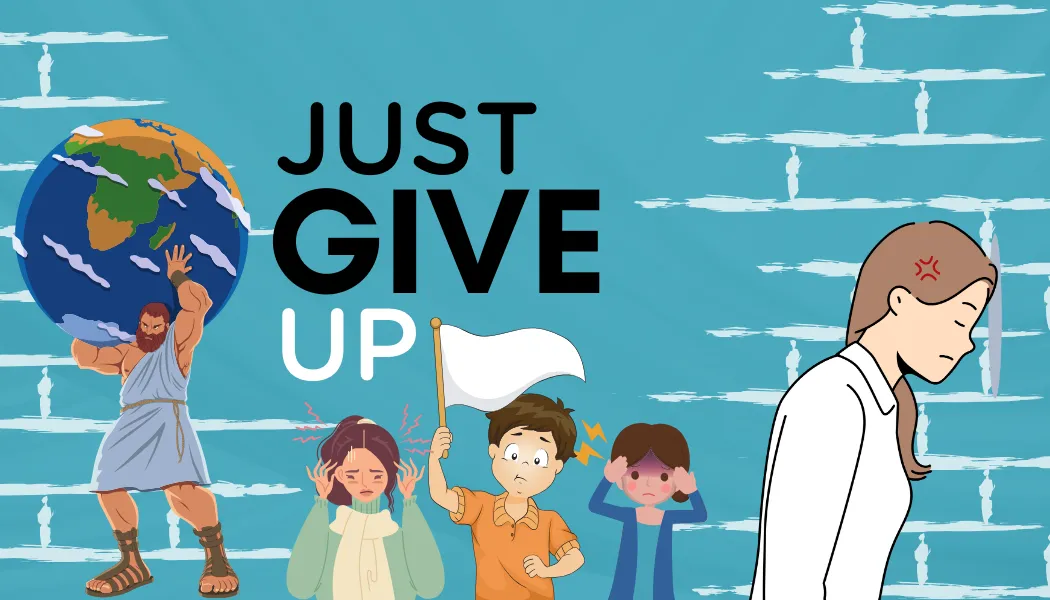General Inquiries: (587) 333-6349 - info@sanostate.com



Just Give Up
“The truth is, knowing when to give up can be very valuable, perhaps even more valuable than persisting unconditionally.” - Blake Ausmus
In the world of motivational quotes and self-help books, we often encounter the advice to "never give up on your dreams." We've all heard the inspiring stories of famous actors, musicians, and entrepreneurs who faced countless rejections and failures before finally achieving success. They tell us, "Don't give up! Keep pushing towards your goal, even when times are tough!" I get chills just thinking about this. These stories are undeniably powerful and motivational, stirring within us the hope that we, too, can reach the pinnacle of success. However, there's a fundamental issue underlying this narrative here - one of selection bias.
Selection bias occurs when we focus on a specific subset of individuals who have achieved remarkable success and ignore the vast majority who didn't reach such heights. In the context of famous actors, for every A-list celebrity, there are many, many other (very) talented and determined actors who never achieve widespread recognition or fame. Does this mean they didn’t push toward their goal enough? Not necessarily. The path to success is often fraught with unpredictable variables, and let’s be clear here: sheer luck can play a substantial role.
Consider the daunting statistics within the entertainment industry: a minuscule percentage of actors registered with SAG-AFTRA, the renowned actors' union, are considered A-list actors - a mere 0.0002%. That's two out of every million that actually make it. These staggering numbers reveal just how rare it is to achieve A-list status. In contrast, your chances of winning a lottery, although still slim, are actually higher than becoming a famous actor. Yet, for some strange reason, we don't apply the same "never give up" advice to purchasing lottery tickets because it doesn't quite resonate in the same way, does it?
The truth is, knowing when to give up can be very valuable, perhaps even more valuable than persisting unconditionally. Let’s not call it giving up, but rather let’s look at it as knowing when to shift your goals and re-evaluate your dreams. It's about recognizing when a particular pursuit may have run its course or when your energies might be better invested elsewhere. Letting go of one path doesn't signify failure; instead, it often opens doors to new opportunities and personal growth.
So, how do you determine when it's time to shift your goals or re-evaluate your dreams? It begins with self-reflection and asking some challenging questions. Are you stuck in a job where promises of advancement never materialize? Are we going on year seven of your boss promising a promotion to be just two years away? Or have you remained in a bad relationship, hoping it will magically improve and wedding bells will chime? These are situations where a change in perspective might be in order.
Shifting goals and re-evaluating dreams isn't exclusive to the entertainment industry or career aspirations; it's a universal concept. I frequently work with clients who have faced debilitating injuries, such as concussions or spinal injuries. Initially, they embark on a recovery journey, determined to regain their previous abilities. However, after a reasonable period of effort and treatment, it sometimes becomes clear that a full recovery may not be attainable. At this point, the focus shifts to adapting to a new reality, redefining what success looks like, and exploring new interests and passions.
The very same principle applies to the aging process. Attempting to hold onto your youth by any means possible can become uncomfortable to watch and ultimately unsatisfying as you will consistently be let down. Embracing the natural aging process and learning to age gracefully involves accepting that your goals and expectations will eventually need to evolve.
But here's the thing about letting go—it's not always easy, and it rarely happens overnight. Letting go often comes after a period of grieving—a mourning of the dream, the relationship, or even the version of yourself you once were. This process can be emotionally challenging, but it's an essential part of growth and renewal.
We often think of grieving a loss in terms of the death of a loved one. But losses can include a loss of your dreams… such as early retirement, being the fastest in the ice rink, or having the energy and body of a younger person. Interestingly enough, these losses can cause the same stages of grief that Kübler-Ross described in her 1969 book “On Death and Dying.”
The lesson here is not simply to "give up" but to recognize that persistence should be tempered with discernment. Sometimes, shifting our goals and re-evaluating our dreams can be the most courageous and wise choice we make. It's about understanding that life is dynamic, and our aspirations should adapt accordingly. So, dare to let go and be proud to give up, and you might just find yourself on a new and brighter path, one filled with newer possibilities.
If this is an area where you could use support, click HERE to connect or call 587-333-6349 💙.
Reference
Kubler-Ross, E. (1999). On Death and Dying. Routledge.
This book has been reprinted many times since its initial publication in 1969.
Disclaimer
Our content is for informational and educational purposes and is not a replacement for professional advice, diagnosis, or treatment. If you're facing mental health concerns, please seek help from a qualified professional for personalized guidance is vital. Every individual's situation is unique, so use the information here at your discretion. While we strive for accuracy, the field of psychology is ever-evolving, and our content may not always reflect the latest research. Please prioritize your privacy by avoiding sharing personal information in comments or interactions. Your well-being is our top concern, so use our content for educational purposes, but remember to rely on professionals for your specific needs.
General Inquiries:
Our Locations:
Additional Resources:
About Us:
We strive for excellence in psychological treatment. We are committed to providing professional, caring, innovative, and research-based services.
© 2024 Sano State Taylored Psychology. All Rights Reserved.

